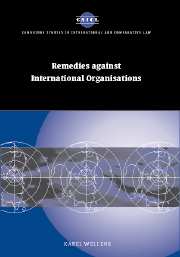Book contents
- Frontmatter
- Contents
- Acknowledgements
- List of abbreviations
- Introduction
- Part I General features of remedies against international organisations
- Part II Procedural aspects of remedial action against international organisations
- 7 Introduction to procedural aspects of remedial action against international organisations
- 8 Procedural aspects of remedial action by member states
- 9 Procedural aspects of remedial action by staff members
- 10 Procedural aspects of remedial action by private claimants
- 11 Procedural obstacles for representational non-governmental organisations
- 12 Procedural obstacles common to remedial action by non-state claimants
- Part III Substantive outcome of remedial action against international organisations
- Part IV Alternative remedial action against international organisations and options for the future
- Conclusion
- Bibliography
- Index
- CAMBRIDGE STUDIES IN INTERNATIONAL AND COMPARATIVE LAW
7 - Introduction to procedural aspects of remedial action against international organisations
Published online by Cambridge University Press: 13 July 2009
- Frontmatter
- Contents
- Acknowledgements
- List of abbreviations
- Introduction
- Part I General features of remedies against international organisations
- Part II Procedural aspects of remedial action against international organisations
- 7 Introduction to procedural aspects of remedial action against international organisations
- 8 Procedural aspects of remedial action by member states
- 9 Procedural aspects of remedial action by staff members
- 10 Procedural aspects of remedial action by private claimants
- 11 Procedural obstacles for representational non-governmental organisations
- 12 Procedural obstacles common to remedial action by non-state claimants
- Part III Substantive outcome of remedial action against international organisations
- Part IV Alternative remedial action against international organisations and options for the future
- Conclusion
- Bibliography
- Index
- CAMBRIDGE STUDIES IN INTERNATIONAL AND COMPARATIVE LAW
Summary
This second part reviews in more detail the procedural aspects facing the different categories of potential claimants when they attempt to resort to quasi-judicial or judicial remedial mechanisms against an international organisation. As procedural justice is an essential precondition for substantive justice, access to mechanisms that can redress harm and impose accountability is vital. Procedure and substance can often not be separated, and the outcome of a procedural dispute is likely to influence the substantive issue.
The inequality between the parties to a dispute may result in non-state claimants leaving the negotiating mechanism and seeking confrontation if and when the international organisation does not make a reasonable attempt to accommodate conflicting interests. Resort to quasi-judicial or judicial remedial mechanisms does not, of course, prevent the parties from reaching a negotiated settlement pending the proceedings. Once the hurdles of availability of and access to mechanisms have been overcome, claimants may then face problems deriving from the internal law of the organisation, such as compliance with the principle of loyalty and discretion or difficulties resulting from the applicable statutes of competent international organs such as international administrative tribunals.
Alleged contractual and non-contractual liability and organisational responsibility trigger the mechanisms envisaged here; we are thus moving away from the first level of accountability. The potential interaction between political and legal remedies should not be underestimated from an accountability point of view. This aspect is returned to in Part IV of this study.
- Type
- Chapter
- Information
- Remedies against International Organisations , pp. 63 - 65Publisher: Cambridge University PressPrint publication year: 2002



